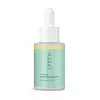What's inside
What's inside
 Key Ingredients
Key Ingredients

 Benefits
Benefits

 Concerns
Concerns

No concerns
 Ingredients Side-by-side
Ingredients Side-by-side

Water
Skin ConditioningCyclopentasiloxane
EmollientDimethicone Crosspolymer
Emulsion StabilisingAcrylates/Beheneth-25 Methacrylate Copolymer
3-O-Ethyl Ascorbic Acid
Skin ConditioningCitrus Reticulata Peel Extract
Skin ConditioningMethylsilanol Mannuronate
Skin ConditioningPhenyl Trimethicone
Skin ConditioningDimethiconol
EmollientC12-15 Alkyl Benzoate
AntimicrobialGlycerin
HumectantTerminalia Ferdinandiana Fruit Extract
AntioxidantBenzyl Alcohol
PerfumingEthylhexylglycerin
Skin ConditioningTocopherol
AntioxidantDimethicone
EmollientSilanetriol
Hyaluronic Acid
HumectantLaminaria Digitata Extract
Skin ProtectingCetyl-Pg Hydroxyethyl Palmitamide
Skin ConditioningCeramide AP
Skin ConditioningSodium Hydroxide
BufferingHydroxyethylcellulose
Emulsion StabilisingTocopheryl Acetate
AntioxidantGardenia Taitensis Flower Extract
Skin ConditioningSambucus Nigra Fruit Extract
AstringentCitrus Aurantium Dulcis Peel Extract
Emulsion StabilisingVaccinium Myrtillus Fruit Extract
Skin ConditioningBenzophenone-4
UV AbsorberParfum
MaskingWater, Cyclopentasiloxane, Dimethicone Crosspolymer, Acrylates/Beheneth-25 Methacrylate Copolymer, 3-O-Ethyl Ascorbic Acid, Citrus Reticulata Peel Extract, Methylsilanol Mannuronate, Phenyl Trimethicone, Dimethiconol, C12-15 Alkyl Benzoate, Glycerin, Terminalia Ferdinandiana Fruit Extract, Benzyl Alcohol, Ethylhexylglycerin, Tocopherol, Dimethicone, Silanetriol, Hyaluronic Acid, Laminaria Digitata Extract, Cetyl-Pg Hydroxyethyl Palmitamide, Ceramide AP, Sodium Hydroxide, Hydroxyethylcellulose, Tocopheryl Acetate, Gardenia Taitensis Flower Extract, Sambucus Nigra Fruit Extract, Citrus Aurantium Dulcis Peel Extract, Vaccinium Myrtillus Fruit Extract, Benzophenone-4, Parfum
Centella Asiatica Leaf Water
Skin Conditioning3-O-Ethyl Ascorbic Acid
Skin ConditioningEthoxydiglycol
HumectantDimethyl Isosorbide
SolventGluconolactone
Skin ConditioningGlycerin
HumectantSodium Gluconate
Skin ConditioningAcetyl Glucosamine
Skin ConditioningSodium Hyaluronate
HumectantPullulan
Hydroxyethylcellulose
Emulsion StabilisingXanthan Gum
EmulsifyingSclerotium Gum
Emulsion StabilisingPhenoxyethanol
PreservativeEthylhexylglycerin
Skin ConditioningLecithin
EmollientLactic Acid
BufferingCitric Acid
BufferingCentella Asiatica Leaf Water, 3-O-Ethyl Ascorbic Acid, Ethoxydiglycol, Dimethyl Isosorbide, Gluconolactone, Glycerin, Sodium Gluconate, Acetyl Glucosamine, Sodium Hyaluronate, Pullulan, Hydroxyethylcellulose, Xanthan Gum, Sclerotium Gum, Phenoxyethanol, Ethylhexylglycerin, Lecithin, Lactic Acid, Citric Acid
 Reviews
Reviews

Ingredients Explained
These ingredients are found in both products.
Ingredients higher up in an ingredient list are typically present in a larger amount.
You might know this ingredient as Ethyl Ascorbic Acid, a more stable version of ascorbic acid.
Like other types of vitamin C, this ingredient has many benefits including reducing wrinkles, skin soothing, dark spot fading, and fighting against free radicals.
3-O-Ethyl Ascorbic Acid interferes with the process of skin darkening, helping to reduce hyperpigmentation. It also encourages the skin to produce more collagen.
Once applied, 3-O-Ethyl Ascorbic Acid is converted to Vitamin C deeper in the skin's layers. This process is slow but makes this ingredient more tolerable for skin.
The optimum pH range for this ingredient is 4 - 5.5
Learn more about 3-O-Ethyl Ascorbic AcidEthylhexylglycerin (we can't pronounce this either) is commonly used as a preservative and skin softener. It is derived from glyceryl.
You might see Ethylhexylglycerin often paired with other preservatives such as phenoxyethanol. Ethylhexylglycerin has been found to increase the effectiveness of these other preservatives.
Glycerin is already naturally found in your skin. It helps moisturize and protect your skin.
A study from 2016 found glycerin to be more effective as a humectant than AHAs and hyaluronic acid.
As a humectant, it helps the skin stay hydrated by pulling moisture to your skin. The low molecular weight of glycerin allows it to pull moisture into the deeper layers of your skin.
Hydrated skin improves your skin barrier; Your skin barrier helps protect against irritants and bacteria.
Glycerin has also been found to have antimicrobial and antiviral properties. Due to these properties, glycerin is often used in wound and burn treatments.
In cosmetics, glycerin is usually derived from plants such as soybean or palm. However, it can also be sourced from animals, such as tallow or animal fat.
This ingredient is organic, colorless, odorless, and non-toxic.
Glycerin is the name for this ingredient in American English. British English uses Glycerol/Glycerine.
Learn more about GlycerinHydroxyethylcellulose is used to improve the texture of products. It is created from a chemical reaction involving ethylene oxide and alkali-cellulose. Cellulose is a sugar found in plant cell walls and help give plants structure.
This ingredient helps stabilize products by preventing ingredients from separating. It can also help thicken the texture of a product.
This ingredient can also be found in pill medicines to help our bodies digest other ingredients.
Learn more about Hydroxyethylcellulose